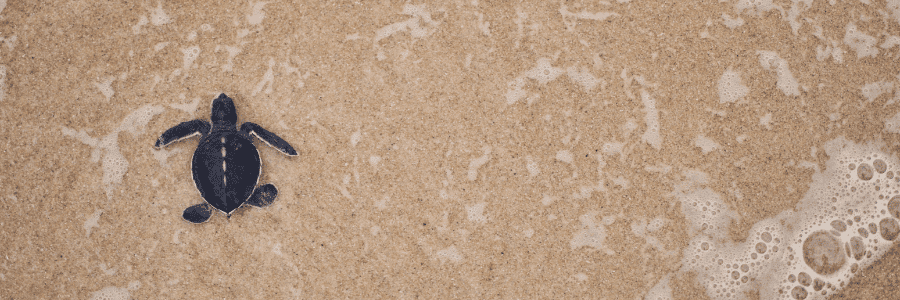Tripped over a turtle, built a legacy: The story of Bubbles Dive Resort

On a quiet morning in 2005, Peisee Hwang stumbled upon a nesting turtle right outside her room on the Perhentian Islands, Malayasia. That unexpected moment opened her eyes to just how many turtles were choosing the beach to lay their eggs. “My husband and I knew we had to act. We made a promise to protect these gentle creatures and to educate others on how to respectfully coexist with them.” That commitment sparked the idea of Bubbles Dive Resort, and soon after, this volunteer conservation project was born.
Sign in to access actionable insights
On a quiet morning in 2005, Peisee Hwang stumbled upon a nesting turtle right outside her room on the Perhentian Islands, Malayasia. That unexpected moment opened her eyes to just how many turtles were choosing the beach to lay their eggs. “My husband and I knew we had to act. We made a promise to protect these gentle creatures and to educate others on how to respectfully coexist with them.” That commitment sparked the idea of Bubbles Dive Resort, and soon after, this volunteer conservation project was born.
Today, Bubbles Dive Resort stands as a beacon of intimate, eco-conscious hospitality on the fringes of Malaysia’s untouched marine beauty. “We were only supposed to run the dive centre. But when we took over the resort, we shaped it through the lens of seasoned travellers. We asked ourselves if we were the guests, what would we need?” co-founder Peisee explains.
That simple, guest-first mindset, evolving with their own life experiences, quickly transformed Bubbles into a haven for families. As new parents, they recognised the stress of travelling with children. So, they created a space where parents could actually relax. Bubbles became the most sought-after family-friendly resort in the region. “Parents tell us that only with us are they really on holiday,” Peisee says.
But what truly sets Bubbles apart is not just its warm hospitality, but the human connection and the sense of home. Guests who once visited as couples now return as families. Some of their children have even returned with partners of their own. “We’re called their home away from home. Our warmth rubs off on the crew too. Guests often say they’ve never seen a happier resort team than ours,” says Peisee.
That joy is contagious and deliberate. At Bubbles, crew happiness is just as important as guest satisfaction. It is a rare ethos in an industry where staff are often treated as invisible cogs in a machine.
And then, there’s the turtles. The serendipitous encounter in 2005 sparked a full-fledged conservation programme. Peisee and her husband vowed that their success would mirror the turtles’ survival. “We made a promise to nature that we would rise with the number of turtles, and fail if they declined,” says Peisee.
Since then, the Bubbles Turtle Conservation Project has released over 170,682 baby turtles into the sea as of 2024. Guests are also encouraged to participate. Nightly turtle talks are hosted at the conservation hall. Guests can even sign up to be awakened for nesting or hatching events. For those craving a deeper experience, Bubbles offers a week-long hands-on programme with the conservation team. The effort is no token gesture and is integrated into the very soul of the resort. “We tirelessly ensure the ecosystem remains as untouched as possible,” says Peisee.
It is a philosophy that has earned them global recognition. Since 2017, Bubbles has consistently ranked among the Top 10 most environmentally friendly operators in the world by Green Fins, clinching the No.1 spot since 2019.
And it has not been easy. Operating a resort on a remote island presents challenges few outsiders can imagine. “Logistics are tough, and everything costs more. We had to run our own generator for years because there was no electricity. Only recently have we started transitioning to solar,” says Peisee.
Yet, they have never let adversity erode their values. From eliminating plastic straws to installing refill stations and switching to biodegradable cleaning products, every change was made one step at a time. “We don’t try to overhaul everything at once. A no-straw policy and no plastic bottles were carried out one at a time,” says Peisee.
For small businesses wondering how to balance sustainability with profitability, Peisee says be patient, be intentional, and be innovative. “And it’s working. Bubbles now operates its conservation project independently, sustaining it through fundraising and experiential programmes, freeing the resort from carrying the financial load alone,” Peisee adds.
What’s even more remarkable is how their conservation efforts have become a barometer for the health of their surroundings. “We don’t have a water treatment plant, so we use biodegradable soaps to keep our waters safe. The number of animals around the resort is the best proof of how undisturbed the environment is.”
Yet, not all collaborations have been successful. They focus on what they can control, like small collaborations with schools and eco-travel groups. In fact, post-pandemic, they have had no active business partners. And still, they persevere. “Everyone has a role. Even reminding guests to bring their own water bottles makes a difference,” says Peisee.
In an age of mass tourism, greenwashing, and corporate hospitality, Bubbles Dive Resort is a rare sanctuary. A place where the hum of generators is slowly replaced by solar power, where turtles nest undisturbed, and where a promise made in the sand became a movement. Maybe it’s time more of us tripped over a turtle.

















